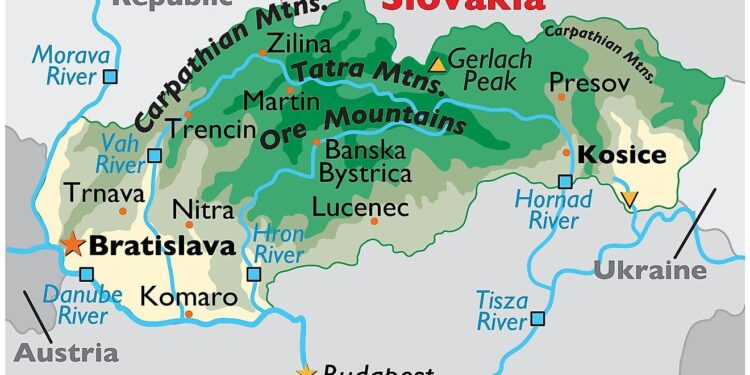Slovakia will not participate in the European Union’s new scheme aimed at supporting Ukraine’s military needs, Prime Minister Robert Fico announced on Monday. The decision marks a significant departure from the collective EU effort to bolster Ukraine amidst ongoing conflict with Russia. Fico cited concerns over Slovakia’s national interests and potential risks involved, underscoring growing divisions within the bloc over how to address the war in Ukraine.
Slovakia Opts Out of EU Military Support Framework for Ukraine
Slovakia has decided to remain outside the European Union’s newly established military support mechanism aimed at bolstering Ukraine’s defense capabilities amid ongoing conflict. Prime Minister Robert Fico emphasized that this decision reflects Slovakia’s current political stance and strategic priorities, highlighting concerns about the deeper military entanglement and the country’s sovereign assessments of security interests.
Key points of Slovakia’s position include:
- Maintaining a neutral approach to avoid direct involvement in conflict escalation.
- Prioritizing diplomatic solutions over military aid frameworks.
- Assessing the potential long-term implications for national security before committing resources.
| Aspect | Slovakia’s Stance |
|---|---|
| Military Support Framework | Opted Out |
| Reason | Political and strategic caution |
| Alternatives | Diplomatic engagement |
| EU Collective Action | Participation declined |
PM Fico Cites Sovereignty and Security Concerns Behind Decision
Prime Minister Robert Fico emphasized Slovakia’s firm stance on maintaining full control over its national security and foreign policy decisions. He articulated that joining the European Union’s collective military support framework for Ukraine could dilute Slovakia’s sovereignty, potentially entangling the country in broader conflicts without sufficient autonomy. According to Fico, the EU scheme raises concerns about Slovakia’s ability to independently manage its defense priorities and assess risks according to its unique geopolitical position.
Highlighting Slovakia’s cautious approach, Fico outlined critical factors influencing the decision:
- Preservation of National Sovereignty: Avoiding commitments that could constrain Slovakia’s independent policy-making.
- Security Risk Assessment: The potential for escalation or unintended consequences on Slovak soil.
- Strategic Neutrality: Minimizing direct involvement in ongoing regional conflicts.
| Factor | Slovakia’s Position |
|---|---|
| Sovereignty | Priority maintained at all costs |
| Military Engagement | Non-participation in EU schemes |
| Regional Security | Focus on national borders |
| Alliance Commitments | Selective and cautious |
Implications for EU Unity and Recommendations for Enhanced Coordination
Slovakia’s decision to abstain from the EU’s consolidated military support scheme for Ukraine exposes underlying fractures within the bloc’s unity on defense and foreign policy matters. This divergence signals a potential challenge for Brussels, as member states weigh national interests against collective action in the face of geopolitical tensions. The refusal may encourage other countries to reconsider their positions, complicating efforts to present a unified front. More critically, it reveals how divergent historical, political, and security concerns influence the willingness of EU countries to engage in joint defense commitments, which could undermine the bloc’s credibility on the international stage.
To mitigate these risks and bolster cohesion, the EU must pursue enhanced coordination mechanisms that respect the sovereignty of member states while promoting strategic alignment. Key recommendations include:
- Establishing a flexible framework that accommodates varying levels of military engagement without compromising the integrity of collective goals.
- Increasing diplomatic dialogue focused on addressing domestic concerns that lead to reluctance or withdrawal from joint initiatives.
- Strengthening transparency and communication around defense spending and resource allocation to build trust.
- Enhancing crisis response planning that integrates both national and EU capabilities efficiently.
| Challenge | Impact on EU Unity | Recommended Action |
|---|---|---|
| National Sovereignty Concerns | Limit commitment to collective defense | Flexible engagement frameworks |
| Divergent Security Priorities | Fragmented military support | Targeted diplomatic efforts |
| Resource Allocation Transparency | Mistrust among member states | Clear communication protocols |
Key Takeaways
As Slovakia steps back from participating in the EU scheme to support Ukraine’s military needs, Prime Minister Robert Fico’s stance underscores ongoing divisions within the bloc on how best to approach the conflict. This decision marks a significant moment in the EU’s collective response and may influence future discussions on defense cooperation and aid to Ukraine. The situation remains fluid, with further developments expected as the region grapples with the broader implications of the war.
















